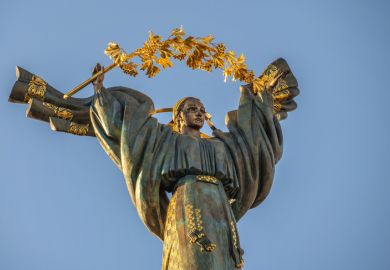With the 2008 Olympics in Beijing on the horizon and in anticipation of an increasingly frenzied build-up to the 2012 event in London, David Clay Large's account of the 1936 Berlin Olympiad comes as a timely reminder of what the Olympics is really about: sportive nationalism. Despite voluminous Olympic rhetoric stressing the noble, humanistic and pacifistic character of the Games, ever since their reinvention at the end of the 19th century by the French aristocrat Baron Pierre de Coubertin, the Modern Olympics have been steeped in nationalistic and ethno-racial supremacist sentiment. Indeed, as Large reminds us, one of the chief motivating factors that inspired de Coubertin to revive the Games was his desire to "strengthen the physical and moral fibre of French youth following France's humiliating defeat by the German states in the Franco-Prussian War of 1870-71".
Those of us brought up in the shadow of the Cold War are used to superpowers flexing their ideological muscles through proxy sporting confrontations. Marking the Soviet Union's first significant engagement with international sport, George Orwell was the first to observe that modern international sport was but "war without weapons". Anybody in any doubt about Orwell's analysis should read this book, as it was in the staging of the 1936 Olympics that this model was perfected.
Set against the backdrop of the rise of Nazism in Germany and the inexorable road towards the Second World War, Large pieces together in considerable detail the complex and controversial circumstances through which the International Olympic Committee awarded the 1936 Games to Berlin, how the international community reacted to this decision, and how, from opening to closing, Hitler's party machine choreographed and stage-managed the whole event for the greater good of the German Reich.
The 1936 Games were awarded to Berlin five years earlier in 1931, two years before Hitler and the National Socialist Party came to power. Hitherto the German approach to international sporting competition had at best been ambivalent, giving priority to Turnerschaft - domestic, gymnastic-type activities and displays of a distinctively Germanic flavour. The Nazis initially shared this view, but as the Modern Games matured, and the prestige associated with Olympic success increased, the prospect of linking them with notions of "national character" was not lost on Hitler and his advisers. Across the border in Italy, Mussolini had actively embraced sport as an important vehicle for Fascist development and propaganda, while on the other side of the world the Japanese were not far behind.
As Large tells us, the warped ideology that underpinned National Socialism celebrated the cult of the body as an essential component of Aryan supremacy. For Hitler, hosting the Olympics in Berlin was viewed as the best possible opportunity to demonstrate the capabilities of a revitalised German Reich. For this to happen, other countries had to be prepared to send their athletes to Germany. Because of the Nazi regime's institutionalised anti-Semitism a boycott of the Berlin Games was openly debated around the world for the first time in Olympic history. Large shows how, through a series of mainly cosmetic gestures, German Olympic officials and their allies within the IOC managed to make it easy for all of the major nations to turn a blind eye to the growing persecution of Jews in Germany and to torpedo talk of a boycott.
Much has been made over the years of the triumphs of Jesse Owens and other African-American athletes who dominated the sprinting and jumping events in Berlin. Undoubtedly this was a challenge to notions of Aryan athletic supremacy - something that clearly irritated the Fuhrer who, while omnipresent throughout the games, managed to avoid meeting Owens or any other of the victorious African-Americans.
Nevertheless, away from the running track the Germans dominated. When the Olympic flame was extinguished, they had amassed 89 medals including 33 gold, significantly more than their nearest rivals, the US, which finished with a total of 56 medals, only eight of which were gold. Hitler's delight was further bolstered by the performances of Italy and Japan, who between them outperformed the fading imperial powers of France and Great Britain. As far as Hitler and his allies were concerned, the war without weapons was won and it was now time to prepare for the real thing.
The final chapter of the book considers the role of actress and film-maker Leni Riefenstahl and the making of Olympia , her iconic documentary of the 1936 Berlin Olympics. There are those who argue that Olympia , along with Riefenstahl's depiction of the 1934 Nuremburg Rally, Triumph of the Will , are films that should be appreciated for their technical and artistic value rather than seen foremost as Nazi propaganda. Large's account leaves one with little sympathy for this view. The original film privileges the achievement of German athletes and exaggerates the role of Hitler in the Games. The film's celebration of the "body beautiful" is clearly an expression of National Socialist Germany's glorification of health, strength and physical perfection and handmaiden to the notion of racial purity.
Nazi Games is a very good book and will be of great interest to scholars of sport history and international relations. It is packed full of lessons for those who have responsibility for hosting and organising major sporting spectacles; and it should be required reading for Lord Coe and the rest of the organising committee for the 2012 London Olympics.
Jon Sugden is professor in the sociology of sport, Brighton University.
Nazi Games: The Olympics of 1936
Author - David Clay Large
Publisher - Norton
Pages - 416
Price - £17.99
ISBN - 9780393058840
Register to continue
Why register?
- Registration is free and only takes a moment
- Once registered, you can read 3 articles a month
- Sign up for our newsletter
Subscribe
Or subscribe for unlimited access to:
- Unlimited access to news, views, insights & reviews
- Digital editions
- Digital access to THE’s university and college rankings analysis
Already registered or a current subscriber? Login



